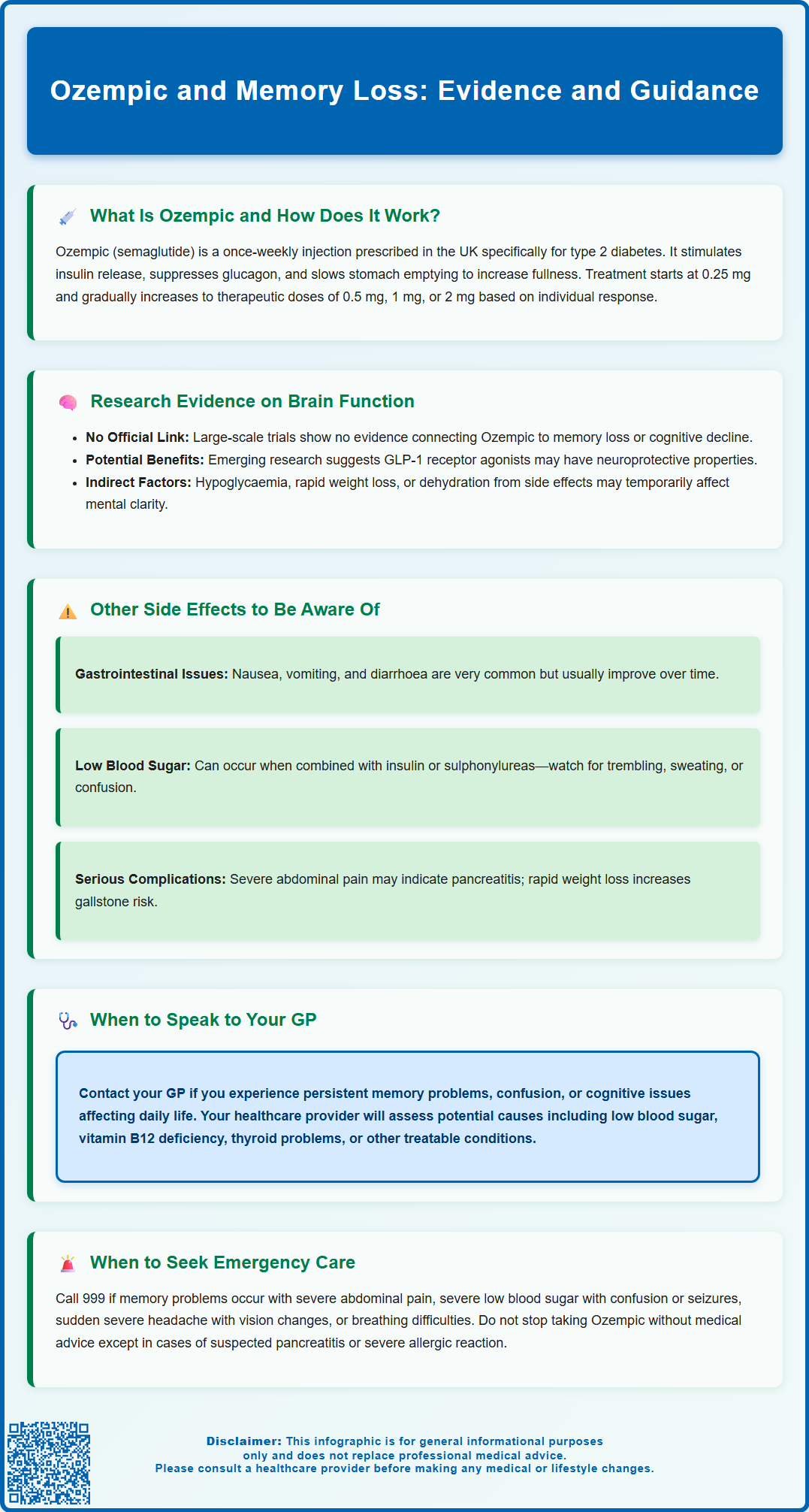Ozempic (semaglutide) is a once-weekly injectable medication licensed in the UK for treating type 2 diabetes. As a GLP-1 receptor agonist, it helps regulate blood sugar and appetite. Some patients have raised concerns about Ozempic and memory loss, prompting questions about potential cognitive effects. Currently, no large-scale clinical trials have established a direct link between semaglutide and memory impairment, and memory loss is not listed as a recognised side effect by the MHRA. This article examines the available evidence, explores possible explanations for reported cognitive symptoms, and provides guidance on when to seek medical advice.
Summary: There is currently no established scientific evidence linking Ozempic (semaglutide) to memory loss or cognitive decline in clinical trials.
- Ozempic is a GLP-1 receptor agonist licensed in the UK for type 2 diabetes, administered as a once-weekly subcutaneous injection.
- Memory loss is not listed as a recognised adverse effect in MHRA-approved product information or NHS resources.
- Emerging research suggests GLP-1 receptor agonists may have neuroprotective properties, though this remains investigational.
- Reported cognitive symptoms may relate to hypoglycaemia, rapid weight loss, dehydration, or gastrointestinal side effects rather than direct drug effects.
- Patients experiencing persistent memory concerns should consult their GP for thorough assessment of potential contributing factors.
- Common side effects include gastrointestinal symptoms (nausea, vomiting, diarrhoea), whilst serious but rare effects include pancreatitis and gallbladder problems.
Table of Contents
What Is Ozempic and How Does It Work?
Ozempic is the brand name for semaglutide, a prescription medicine licensed in the UK for the treatment of type 2 diabetes mellitus. It belongs to a class of medications called glucagon-like peptide-1 (GLP-1) receptor agonists, which mimic the action of a naturally occurring hormone in the body that helps regulate blood sugar levels and appetite.
The medication works through several complementary mechanisms. Primarily, semaglutide stimulates insulin secretion from the pancreas when blood glucose levels are elevated, whilst simultaneously suppressing the release of glucagon, a hormone that raises blood sugar. This dual action helps maintain more stable glycaemic control throughout the day. Additionally, Ozempic slows gastric emptying, meaning food remains in the stomach longer, which contributes to increased satiety and reduced appetite.
Ozempic is administered as a once-weekly subcutaneous injection, typically starting at a low dose of 0.25 mg for 4 weeks. This initial dose is solely to improve gastrointestinal tolerability and is not intended for glycaemic control. The dose is then gradually increased to therapeutic doses of 0.5 mg, 1 mg, or 2 mg, depending on individual response and tolerability. The MHRA approved Ozempic for use in the UK in 2018, and NICE guidelines (NG28) recommend GLP-1 receptor agonists like semaglutide as part of a treatment strategy for type 2 diabetes when metformin and other medications have not achieved adequate glycaemic control. It's important to note that while Ozempic may result in weight loss, it is not licensed for weight management in the UK – a higher-dose formulation of semaglutide called Wegovy is specifically licensed for obesity treatment in eligible adults. The medication should always be used alongside dietary modifications and increased physical activity for optimal therapeutic benefit.

Research Evidence on Semaglutide and Brain Function
Concerns about potential cognitive effects, including memory loss, have emerged among some patients taking Ozempic, prompting questions about whether there is a scientifically established link. Currently, there is no official evidence from large-scale clinical trials directly linking semaglutide to memory impairment or cognitive decline. Memory loss is not listed as a recognised adverse effect in the Summary of Product Characteristics (SmPC) approved by the MHRA or in NHS patient information resources.
Interestingly, emerging research suggests that GLP-1 receptor agonists may actually have neuroprotective properties, though this remains investigational. GLP-1 receptors are present in various brain regions, including areas involved in learning and memory such as the hippocampus. Preclinical studies have indicated that GLP-1 analogues might reduce neuroinflammation and promote neuronal survival. Several ongoing clinical trials, including the EVOKE and EVOKE+ studies, are investigating whether semaglutide could potentially have beneficial effects in Alzheimer's disease, but results are pending and no cognitive benefits in humans have been established.
However, it is important to acknowledge that individual patient experiences vary, and some people have reported subjective cognitive changes whilst taking Ozempic. These reports may be related to several factors:
-
Hypoglycaemia: Low blood sugar episodes can cause confusion, difficulty concentrating, and temporary memory problems. This is uncommon with semaglutide alone but more likely when combined with insulin or sulphonylureas
-
Rapid weight loss: Significant caloric restriction may temporarily affect energy levels in some individuals
-
Gastrointestinal side effects: Nausea, vomiting, and reduced food intake may lead to dehydration that impacts mental clarity
If you experience memory concerns whilst taking Ozempic, it is essential to discuss these with your healthcare provider, who can assess whether other factors might be contributing and determine the most appropriate course of action.
Other Side Effects of Ozempic to Be Aware Of
Like all medications, Ozempic can cause side effects, though not everyone experiences them. Understanding the most common and serious adverse effects can help you recognise when medical attention may be needed.
Gastrointestinal effects are the most frequently reported side effects, particularly when starting treatment or increasing the dose. According to the SmPC, these include:
-
Nausea (very common, affecting more than 1 in 10 patients)
-
Vomiting (common)
-
Diarrhoea (very common)
-
Constipation (common)
-
Abdominal pain or discomfort (common)
These symptoms are usually mild to moderate and tend to improve over time as your body adjusts to the medication. Small, frequent meals, avoiding high-fat or spicy foods, maintaining good hydration, and following the gradual dose escalation schedule can help manage these effects. Contact your healthcare team if symptoms are severe or persistent.
Hypoglycaemia (low blood sugar) can occur, especially when Ozempic is used in combination with sulphonylureas or insulin. Symptoms include trembling, sweating, confusion, rapid heartbeat, and dizziness. Your healthcare team may need to reduce doses of these other diabetes medicines to minimise this risk.
More serious but less common side effects include:
-
Pancreatitis: Severe, persistent abdominal pain that may radiate to the back requires immediate medical attention. If pancreatitis is suspected, stop taking Ozempic and seek urgent medical care. If confirmed, treatment with semaglutide should not be restarted
-
Gallbladder problems: Rapid weight loss can increase the risk of gallstones, which may cause right upper abdominal pain, fever, or yellowing of the skin/eyes (jaundice)
-
Diabetic retinopathy complications: Patients with existing eye disease should be monitored closely, especially during periods of rapid improvement in blood glucose control
-
Acute kidney injury: Usually associated with severe dehydration from gastrointestinal side effects
Allergic reactions, though rare, can occur and may present as rash, itching, or difficulty breathing. Injection site reactions such as redness, itching, or swelling are generally mild. If you experience any persistent or concerning symptoms, contact your GP or diabetes specialist nurse for guidance. You can also report suspected side effects via the MHRA Yellow Card scheme at yellowcard.mhra.gov.uk or through the Yellow Card app.
When to Speak to Your GP About Memory Concerns
Whilst memory loss is not an established side effect of Ozempic, any new or worsening cognitive symptoms warrant medical evaluation. You should contact your GP or diabetes care team if you experience:
-
Persistent difficulty remembering recent events or conversations
-
Confusion or disorientation that is unusual for you
-
Difficulty concentrating or completing familiar tasks
-
Changes in mood, personality, or behaviour
-
Memory problems that interfere with daily activities or work
Your healthcare provider will conduct a thorough assessment to identify potential causes. This may include reviewing all your medications, as some drugs can affect cognitive function, and checking for conditions that commonly impact memory such as:
-
Hypoglycaemia: Your GP may review your blood glucose monitoring records and adjust diabetes medications if needed
-
Vitamin deficiencies: Particularly B12, which should be checked in patients on long-term metformin who develop cognitive symptoms
-
Thyroid dysfunction: Both hypothyroidism and hyperthyroidism can cause cognitive symptoms
-
Depression or anxiety: Mental health conditions frequently affect concentration and memory
-
Sleep disorders: Poor sleep quality significantly impacts cognitive performance
Seek urgent medical attention (call 999 or go to A&E) if memory problems are accompanied by:
-
Severe, persistent abdominal pain (possible pancreatitis)
-
Signs of severe hypoglycaemia (confusion, loss of consciousness, seizures)
-
Sudden severe headache, vision changes, or weakness on one side of the body
-
Difficulty breathing or swallowing
For urgent but non-life-threatening concerns, you can contact NHS 111 for advice. Your GP may refer you to a specialist if cognitive concerns persist despite addressing reversible causes. Do not stop taking Ozempic without medical advice, except if you suspect pancreatitis or a severe allergic reaction, as abrupt discontinuation can affect your diabetes control. A collaborative approach with your healthcare team ensures both your diabetes management and overall wellbeing are optimally supported.
Frequently Asked Questions
Can Ozempic cause memory problems?
Currently, there is no established evidence from clinical trials linking Ozempic to memory loss, and it is not listed as a recognised side effect by the MHRA. However, if you experience memory concerns whilst taking Ozempic, discuss them with your GP to identify potential contributing factors.
What should I do if I experience cognitive symptoms whilst taking Ozempic?
Contact your GP or diabetes care team if you notice persistent difficulty remembering events, confusion, or concentration problems. Your healthcare provider will assess potential causes such as hypoglycaemia, vitamin deficiencies, or other medications that may affect cognitive function.
Are there any brain-related benefits of Ozempic?
Emerging research suggests GLP-1 receptor agonists like semaglutide may have neuroprotective properties, with ongoing clinical trials investigating potential benefits in Alzheimer's disease. However, no cognitive benefits in humans have been established, and these findings remain investigational.
The health-related content published on this site is based on credible scientific sources and is periodically reviewed to ensure accuracy and relevance. Although we aim to reflect the most current medical knowledge, the material is meant for general education and awareness only.
The information on this site is not a substitute for professional medical advice. For any health concerns, please speak with a qualified medical professional. By using this information, you acknowledge responsibility for any decisions made and understand we are not liable for any consequences that may result.
Heading 1
Heading 2
Heading 3
Heading 4
Heading 5
Heading 6
Lorem ipsum dolor sit amet, consectetur adipiscing elit, sed do eiusmod tempor incididunt ut labore et dolore magna aliqua. Ut enim ad minim veniam, quis nostrud exercitation ullamco laboris nisi ut aliquip ex ea commodo consequat. Duis aute irure dolor in reprehenderit in voluptate velit esse cillum dolore eu fugiat nulla pariatur.
Block quote
Ordered list
- Item 1
- Item 2
- Item 3
Unordered list
- Item A
- Item B
- Item C
Bold text
Emphasis
Superscript
Subscript










